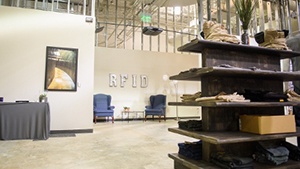Who Pays for Retail RFID Tagging?
Whether the brand buys the tags or the retailer subsidizes tagging, the cost will be absorbed into the cost of the item in the long run. We still have a few apparel retailers ask us about cost of goods increases for RFID tagged items. What many of them don’t realize is that the per-item cost of apparel RFID is quickly becoming independent of whether or not the retailer actually has an RFID program. Unless it’s an exclusive or private label item, retail RFID tagging is fast becoming a standard feature rather than a retailer requested option.
Now that the majority of the top 100 apparel retailers in the US have active RFID deployment programs, brands that are selling to multiple retail customers are eventually going to have to decide whether to try to segregate RFID tagged inventory in their supply chain for a particular retailer, or just go ahead and tag everything with RFID tags whether their other retail customers requested the tags or not.
Surprisingly, the number at which most brands shift over to the “just tag everything strategy” is much lower than one might think. Typically once 35-40% of items are being shipped to an RFID enabled retailer, the brands will go ahead and tag the other 60-65%, even though those retailer customers may not even be requesting the tags yet. Its just cheaper and easier than sorting RFID tagged from non-RFID tagged inventory.

We actually went to one retailer to help them with their RFID tagging program for denim, and in the store we immediately began scanning thousands of RFID tags on non-denim items. We found that their entire store inventory of men’s dress slacks was already tagged! They were at full brand compliance, even though they hadn’t scheduled that category for rollout until months in the future. RFID had already tipped for their brands, all they had to do was collect the data and reap the benefits.
In the olden days of item-level retail between 2010-2013, single retailers were still driving their supplier base to RFID. Those days are long gone. Even though some retailers still believe they have the mandate to request or reject apparel RFID tags and their incremental cost, they are simply too late to the game to understand that the market has already passed them by.
Now that most brands and contract manufacturers have experience with RFID, the barriers to adoption are smaller. As the market tops 5 billion tagged items this year, and apparel RFID has crested the adoption curve to common practice, new non-apparel items with high demand for “click and collect” or Buy Online Pick Up In Store (BOPUS) are fast becoming the next generation of RFID tagging demand.
Electronics and Sporting Goods are the first targets, as they are categories that savvy customers tend to heavily research online before making purchases to stores. Retailers are learning the hard way that they simply cannot prevent disappointing their customers unless they can get their inventory accuracy up towards 95% plus, and the only proven technique in retail today to attain reliable inventory accuracy levels beyond 80% is with RFID.
Why is it that brands are more willing to invest in RFID on their items now than in the past? What has changed about data management, serialization, and the cost of tagging that reduces the financial burden? Why are some brands now asking their retail partners to hurry up and adopt RFID in their stores?
These are all pressing questions we plan to answer on our blog early in 2017. Please check back often as we get to the bottom of these FAQs. Looking for more information in the meantime? Click below to view the research paper section on our website to see all of our research over time.
Auburn RFID Lab
Auburn University's RFID Lab specializes in the business case and technical implementation of radio frequency identification technology in retail, supply chain and manufacturing settings.
In moving to Auburn University in 2014, the lab was reunited with its founder, Harbert College of Business Dean Bill Hardgrave. Hardgrave helped launch the lab at the University of Arkansas in 2005.
The lab has continued to work with leading retail, supply chain, manufacturing and technology companies.
